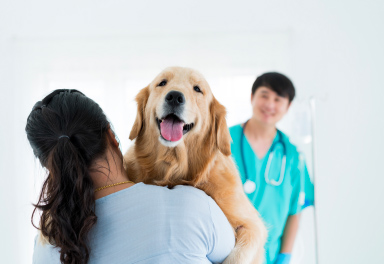Mind Body and Wag

A dog’s health care is an owner’s lifelong responsibility. Canine health starts with a well-balanced diet, exercise, play time and sufficient sleep. Annual checkups should be part of the routine, along with regular grooming and plenty of socialization. If you are aware of a specific ailment, proper veterinary care is important. Also, unexpected or abrupt changes in behavior can signify that something may be amiss and a vet appointment may be prudent.
A dog’s only means of communicating their physical, emotional, and health needs is through behavior:

Regressive, lethargic, anxious, aggressive, disoriented, and even obsessive behaviors are often mistaken for “poor” behavior. But each can be an indication of a distressing health condition requiring immediate medical care.
As a dog trainer, when I am called in to address a dog’s behavioral issue, I first require a thorough veterinary health check to rule out any underlying medical condition that may be altering a dog’s daily activities. What I ask for is a full wellness check, including the hips, joints, anal glands, teeth, eyes, thyroid and liver test. For dogs over seven years of age I recommend a bi-annual health check.
This allows me to adjust my training methodology to the needs of the dog. For example: If I am training an eight-year-old dog that has the onset of arthritis in his back legs, I will be much more sensitive in teaching him a sit or down command.
Additionally, on a rainy day, I will keep in mind that an arthritic dog will likely become more sensitive to be touched or handled. A different pooch may seem distracted or disinterested in their food. This could be attributed to having a toothache or an infection of some sort. Owners can often sense when their dog isn’t themselves. Look for signs and don’t ignore your owner instincts when it comes to knowing your dog. Some dogs can be asymptomatic and will need to count on your intuition to resolve.
With my dog, Walter, he was becoming more aggressive and avoiding my touch, only to learn later after my vet visit that he had a broken rear tooth that was causing significant pain and causing this aggression. After the tooth was extracted, he was back to being my usual love bug. Also, he is a dog that needs to have his anal glands expressed every 6-8 weeks and it clearly affects his behavior if not done regularly.
Dogs are remarkably adaptable and resilient when it comes to health challenges. They have no problem telling us someone is at the front door or nose nudging or a play bow when they want attention or are bored. Dogs will bark, bring us their leashes or coax using expressive raised eyebrows with a slight cock of the head that induces guilt when they want us to take them to the park.
But they are not necessarily good at letting us know about health issues. Telling us when they are sick, in pain or off their game can be more of a challenge. To protect themselves from predators, their inherent survival instincts are geared toward concealing any signs of illness or pain.

Health from Head to Tail: Many dogs ignore commands, and some have legitimate reasons. Deafness can come on suddenly, or gradually with age. The same is true of vision loss. If Boomer is banging into furniture, it’s unlikely he stopped by the dog run for a quick martini. Be proactive with your dog’s health and examine him head to tail. When a dog exhibits signs he’s ill or his behavior is off, it helps if owners write down his training and medical lifestyle details. On paper these details help an owner, trainer, or veterinarian make a proper evaluation about your dog’s health. Diet is Everything:
A dog’s diet can arguably be considered the most influential aspect of canine health and behavioral issues. Yet knowing how to pick a dog’s food can be challenging. Choosing the right food will directly impact how your dog feels, acts and functions. Is protein revving up your dog? Or is a lack of sufficient protein the cause of lethargic behavior, a dull coat or even irritability? Grains (ie., corn and wheat) may cause allergic reactions in some pooches while others can tolerate them without a problem. The list goes on and on, so I urge you to become the Sherlock Canine Holmes not only with training but also with diet. Go online, talk with your vets, investigate, and understand what you are really feeding your dog.
Exercise is a Must: Losing weight and getting in shape physically and mentally are the primary reasons people exercise…the same principles hold true for dogs. Coupled with a balanced diet, exercise increases serotonin and endorphin levels, which produces a calm, relaxed and happy dog. In high concentrations, these neurochemicals are known to reduce anxiety, relieve depression. All this summarizes my motto, which is… “exercise, exercise, exercise and socialize!” Now that we’ve discussed exercise, the right amount of rest for your dog is just as important as well as adding some play time with your pooches!
Common sense and preventative care is always advised when it comes to canine health. Dogs can’t take themselves to a veterinarian and delays could exacerbate a problem. Health checks can often reveal an underlying cause for unwanted behavior. Remember that a behavioral issue can sometimes be linked to health, diet, genetics or environment so always consider this when calling in a dog trainer.
A dog’s health is dependent on an owner making good decisions for them. A proper amount of physical and mental stimulation is the key to successful guardianship. Though a veterinarian administers medical care, a dog’s health is ultimately the owner’s responsibility.s







